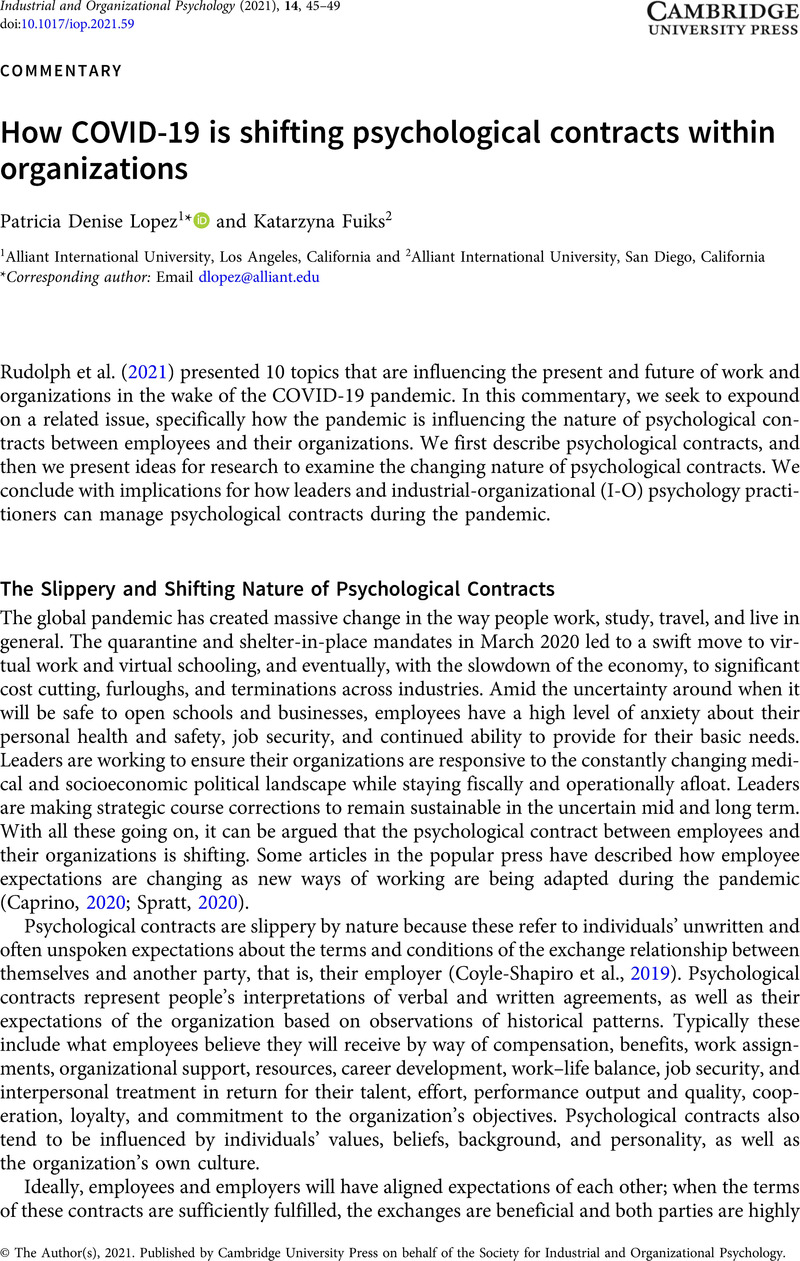Crossref Citations
This article has been cited by the following publications. This list is generated based on data provided by Crossref.
Ben Hassine, Anissa
Fessi, Safa
and
Berrazaga, Imen
2022.
De l’effet contrasté des crises sur les comportements de citoyenneté organisationnelle – Étude dans la filiale tunisienne d’un centre d’appel français.
Revue internationale de psychosociologie et de gestion des comportements organisationnels,
Vol. Vol. XXVIII,
Issue. 73,
p.
37.
Manolopoulos, Dimitris
Peitzika, Eirini
Mamakou, Xenia J.
and
Myloni, Barbara
2022.
Psychological and formal employment contracts, workplace attitudes and employees’ turnover intentions: Causal and boundary inferences in the hotel industry.
Journal of Hospitality and Tourism Management,
Vol. 51,
Issue. ,
p.
289.
Deas, Alda
and
Coetzee, Melinde
2022.
A value-oriented psychological contract: Generational differences amidst a global pandemic.
Frontiers in Psychology,
Vol. 13,
Issue. ,
Ronnie, Linda
du Plessis, Marieta
and
Walters, Cyrill
2022.
Women academics and the changing psychological contract during COVID-19 lockdown.
Frontiers in Psychology,
Vol. 13,
Issue. ,
Kakkar, Shiva
Kuril, Samvet
Singh, Swati
Saha, Surajit
and
Dugar, Anurag
2023.
The influence of remote work communication satisfaction and CSR association on employee alienation and job satisfaction: a moderated-mediation study.
Information Technology & People,
Vol. 36,
Issue. 5,
p.
1810.
Abord de Chatillon, Emmanuel
Bornard, Fabienne
Ottmann, Jean-Yves
and
Felio, Cindy
2023.
Losing faith in paid employment: an extension of the psychological contract breach model as a predictor of self-employment.
Journal of Management Development,
Vol. 42,
Issue. 7/8,
p.
529.
Abu Bakar, Raida
Che Hashim, Rosmawani
Low, Man Chung
Rezaur Razzak, Mohammad
and
Jayasingam, Sharmila
2023.
Effects of the Covid-19 Pandemic on Employee Well-Being.
p.
85.
Anvari, Roya
Kumpikaitė-Valiūnienė, Vilmantė
Mobarhan, Rokhsareh
Janjaria, Mariam
Hosseinpour Chermahini, Siavash
and
Baker, Rogis
2023.
Strategic human resource management practitioners’ emotional intelligence and affective organizational commitment in higher education institutions in Georgia during post-COVID-19.
PLOS ONE,
Vol. 18,
Issue. 12,
p.
e0295084.
Dash, Itilekha
and
Gupta, Jaya
2023.
Exploring student psychological contract in the hybrid mode of business education: a mixed-method study.
International Journal of Educational Management,
Vol. 37,
Issue. 4,
p.
768.
De Ruiter, Melanie
and
Schalk, Rene
2023.
Virtual Management and the New Normal.
p.
121.
Tkalac Verčič, Ana
and
Špoljarić, Anja
2023.
Effects of an external crisis: How internal communication influences employer brands.
Journal of Contingencies and Crisis Management,
Vol. 31,
Issue. 4,
p.
599.
Manuti, Amelia
and
de Palma, Pasquale Davide
2023.
Digital HR.
p.
31.
Chen, Chih-Jou
Tsai, Pei-Hsuan
and
Wu, Ju-Chuan
2024.
The impacts of transformational leadership on emotional labour in Taiwanese private nonprofit long-term care institutions: the mediating role of psychological contract.
Asia Pacific Business Review,
Vol. 30,
Issue. 4,
p.
691.
Gutworth, Melissa B.
Howard, Matt C.
and
Simonet, Daniel V.
2024.
Mandated but willing? Preferences and expectations among mandatory work from home employees.
Human Resource Management Journal,
Vol. 34,
Issue. 3,
p.
627.
Rebehn, Christian
Nichol, Lynn
and
Bell, Robin
2024.
Northern German hotel employees’ expectations of employer inducements: Development of a context-specific Q-set.
International Journal of Human Resource Development: Practice, Policy and Research,
Vol. 8,
Issue. 2,
p.
66.
Kumar, Vimal
Verma, Priyanka
Mittal, Ankesh
Gupta, Pradeep
Raj, Rohit
and
Kaswan, Mahender Singh
2024.
Addressing the Kaizen business operations: the role of triple helix actors during COVID-19 outbreak.
The TQM Journal,
Vol. 36,
Issue. 6,
p.
1665.
Gulzar, Saba
Hussain, Kanwal
Akhlaq, Ather
Abbas, Zuhair
and
Ghauri, Shagufta
2024.
Exploring the psychological contract breach of nurses in healthcare: an exploratory study.
Asia-Pacific Journal of Business Administration,
Vol. 16,
Issue. 1,
p.
204.
Walk, Marlene
Stewart, Amanda J.
and
Kuenzi, Kerry
2024.
Investigating Turnover Intentions During Organizational Change: The Role of Negative Appraisals, Psychological Contract Violation, and Resistance to Change.
Nonprofit and Voluntary Sector Quarterly,
Vol. 53,
Issue. 6,
p.
1434.
Joshy, Lishin M.
Mohandas, Nimmi P.
and
Verma, Govind Gopi
2024.
Interplay of paradoxical virtual leadership and psychological contract violation – impact on organizational citizenship behavior.
Leadership & Organization Development Journal,
Vol. 45,
Issue. 8,
p.
1471.



